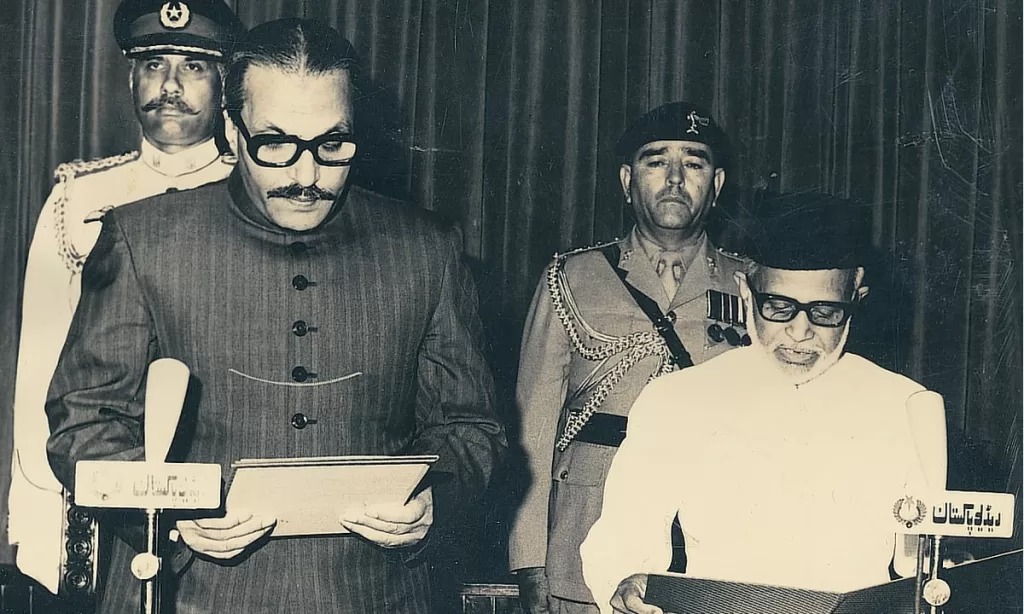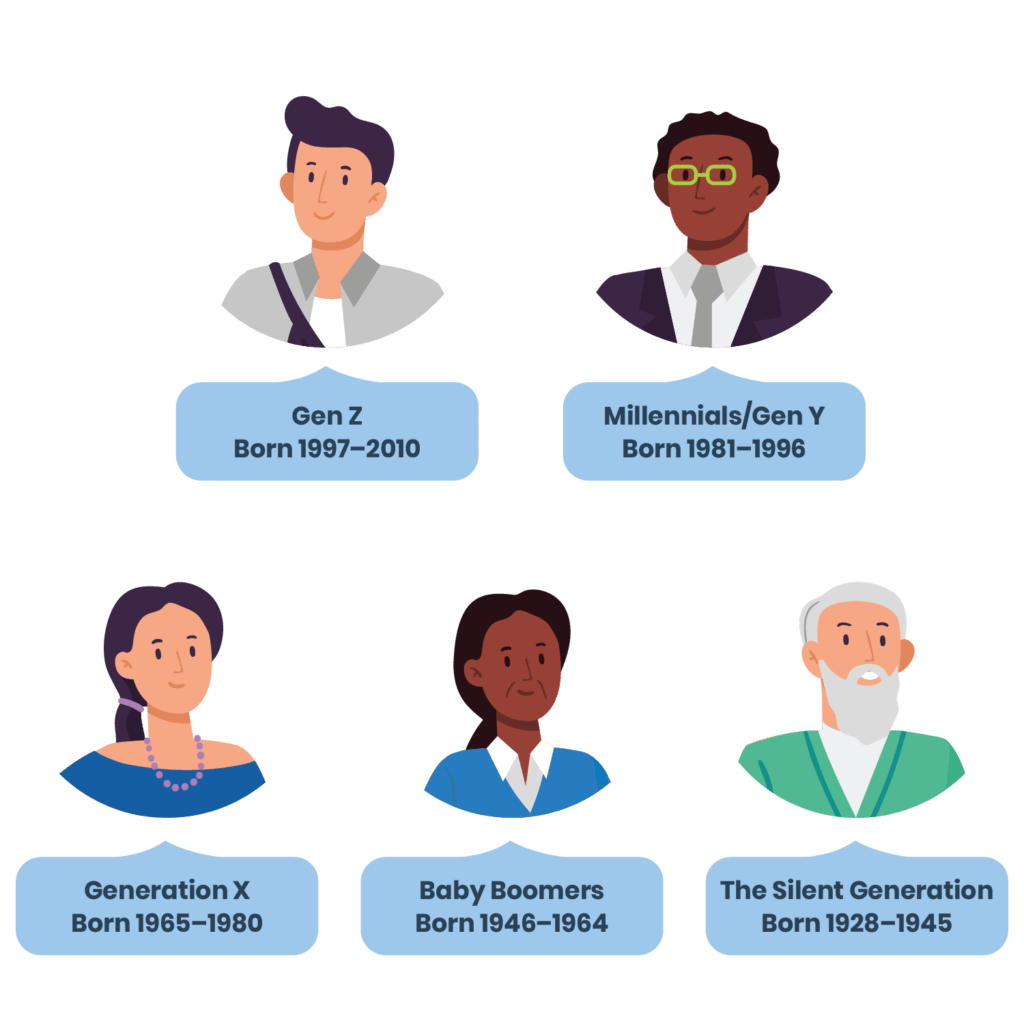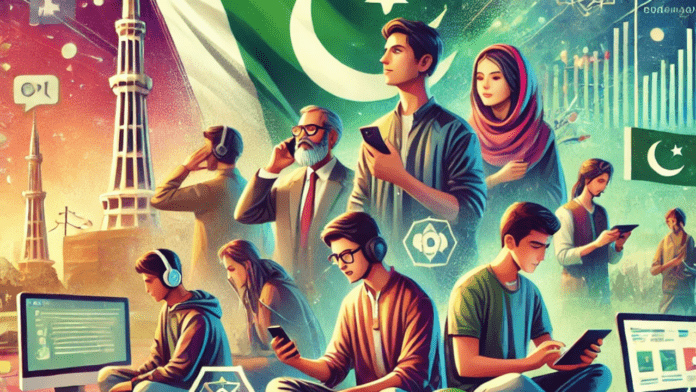Calling Pakistan’s creation political is just one part of the entire story. It was a constant struggle from the day the idea was put into the minds and hearts of the people in the subcontinent to the day it was created. It was a promise to the generation of that time and the ones in the future; it was a hope that lingered on and which created the sacrifice of souls even in the years after the partition. There is often a misconception regarding creation, that the struggle is only till creating something, when it is only half of the battle; maybe thirty or forty percent of the whole daunting task. The real struggle often begins afterward.
And this is exactly what Pakistan is all about. In 1947, when Pakistan emerged as an independent State, it did so amid chaos, bloodshed, and sacrifice. This was a moment written down in history by those founding fathers who wanted a sanctuary for Muslims more than a land. The new nation was crafted to be a homeland for millions of Muslims in the subcontinent. But nations are never built in a day – there was so much confusion and migration was not easy,it was not like crossing a road through a red-light zebra crossing, but more like a busy junction with hundreds of cars speeding at 120 km/hour towards the people. This analogy may seem odd, but many lives were lost at that time, creating more chaos for food, shelter, and the need for basic necessities. This generation saw repeated mishandling from Britishers and Hindus alike, and after the announcement that Pakistan was created, there was this massive migration of Hindus to India and Muslims to the new Pakistan. Muslims left their businesses, their homes, and other possessions for Pakistan and there was fear in the air of even reaching safely, as some Hindu extremists were trying to stop people from migrating.
At that time, Pakistan was like a refugee camp; the founders’ dreams and aspirations felt far-reaching, and the promises made had to wait for that generation. As decades passed, these generations, the founding generation of Pakistan, did not eat the fruits they sowed. They did it for the future generations to come.
The sacrifices of one generation have often been consumed by another, while each has left its permanent mark – sometimes as builders, at times as reluctant inheritors. Now, as Gen Z has started to enter the career field and soon would take on the reins of a nation in crisis, along with the Gen Alpha and futuristic Gen Beta, we must look at the pressing reality.
What are we leaving for them? What are we building, if anything, that they can call their foundation? Or are we simply leaving them the wreckage of our decisions, forcing them to fight battles they did not start? Are they going to be left like us, picking the broken pieces of the past and trying to build the future with what is left? And if they start thinking about themselves, for no one thought about them, would there be a sense of nation, at all?
The founding generation of Pakistan – the architects of its independence – lives and breathes sacrifice. Born under colonial rule, they were individuals hardened by the inequality and injustice all around them. They were born with a self-determination and vision to bring about a change and they did. Stalwarts like Muhammad Ali Jinnah and Liaquat Ali Khan envisioned a nation after Allama Muhammad Iqbal dreamt of a separate homeland, where Muslims could thrive without fear of discrimination and openly follow their religion.
These towering figures fought and sacrificed a lot to make their dream into reality. For the millions who migrated to the new homeland, leaving behind their ancestral homes and generational wealth, their hopes, determination, and trust all depended on this dream.
This generation built a nation where none existed – from scratch. They crafted everything from governance structures to educational institutions. The sacrifice was so monumental, with uprooted families, displaced people, and spilled blood, that laying the foundation of a country envisioned as a sanctuary was itself a feat. The establishment of key institutions like the State Bank of Pakistan, the Pakistan Armed Forces, the Karachi Port, and a fledgling industrial sector was grounded along with housing for the homeless who had left their home. This generation gave what was needed to build a complete Pakistan.
Baby Boomers, the generation from 1946 to 1964, can be called the foundational generation of Pakistan. This time the foundation was sowing the roots of Pakistan’s judiciary, defining its laws, guiding its politics, shaping its economy, and setting the stage for its global identity. However, this generation was not immune to the fissures of their time. Political infighting, economic disparities, and ethnic tensions sowed seeds of discord that would hurt their successors. It was like a survival test where a young Pakistan was struggling to create a national order and international presence. Baby Boomers worked harder to establish the stepping stone for the future, their work incomplete by necessity left the generations with an immense responsibility.
Under this generation, Pakistan was fresh with possibilities. They were the architects of the industrial growth of the 1960s, a period often referred to as the ‘decade of development.’ Under Ayub Khan’s leadership, Pakistan saw infrastructure projects like the Mangla and Tarbela Dams and there were many agricultural reforms to laud the Green Revolution. Yet this same generation also bore witness to the catastrophic disintegration of the country in 1971, when East Pakistan separated to become Bangladesh. This event marked a turning point for Pakistan as it was concluded that the nation was fragile and was still grappling with its identity.
Boomers contributed significantly to Pakistan’s growth, particularly in education and industry, yet they also set a pattern for short-term thinking. It was like a race to achieve something without stopping to think about the other side of the coin. Everything was new and happening, and contingency plans were not put into effect. Pakistan was fed with whatever schemes came into mind and every leader that came in that period, more similar to what is happening in the present, did what they thought was right. Not much thought was given to what was right for Pakistan and its people. At this time in history, we see where the Green Revolution of the 1960s boosted agricultural productivity, it failed to address the systemic inequities.
Similarly, rapid urbanization created economic hubs in Karachi, Lahore, Rawalpindi, and Islamabad but left rural areas lagging. By the 1980s, as the Baby Boomers aged into leadership roles, Pakistan began to feel the strain of their inability to address deep-seated issues like corruption, political instability, and economic inequality.
Something that historically is repeated in Pakistan, and it is still here in the present-day – Power! The hunger for power makes one so greedy that once in a position to rule, it is hard to delegate or give that position to anyone else. This characteristic is not only seen in politics but on the leadership business levels as well. The older generation never leaves the room for change, nor does it allow the younger generations to bloom. This creates a rift called the generational gap, and to this date, Pakistan has often been played at the hands of these gaps where the new generation wants to change things while the older generation seems to cling on to the ways of the past.

Generation X took over the retired Baby Boomers, born between the mid-1960s and early 1980s, and they are the ones who grew up in the shadow of these challenges. Their formative years were defined by the authoritarian rule of Zia-ul-Haq, a period that reshaped Pakistan’s cultural and political landscape. Zia’s Islamization policies left a permanent mark, embedding religious belief into laws, education, and everyday life. At the same time, Pakistan’s involvement in the Soviet-Afghan War transformed the nation into a key player on the global stage, though at significant cost. Gen X bore witness to contradictions – Pakistan’s role as a Cold War ally brought economic benefits but left a legacy of instability due to the Afghan Conflict. Even with authoritarian rule, Pakistan could finally express itself through art, literature, and activism, creating a culture.
There was quite a turmoil at this time, where some things in Pakistan were thriving, a few might be a tick in time. As systematic corruption and economic disparity continued to spread its roots, Pakistan became a battleground of ideals and realities for Gen X.

A nation filled with potential and yet weighed down by cyclical crises. The 1980s and the 1990s saw the emergence of iconic television dramas, pop music legends like Vital Signs, and an expanding literary scene. Urdu was mostly rejoiced at this time in the form of poetry, ghazals, and dramas, portraying the true essence of Pakistan. Music being the language that needs no words or understanding started being introduced internationally. As Gen X navigated and contributed to culture, this generation also struggled with systemic stagnation. Opportunities were dwindling and meritocracy often gave way to nepotism. Gen X responded to these pressures with remarkable adaptability. They created cultural outlets where freedom was stifled and they contributed to the golden age of Pakistani television.
Millennials, or Gen Y, born between 1981 and 1996, entered adulthood in a world increasingly shaped by globalization and technology. The internet revolution transformed their lives, offering unprecedented access to information and opportunities. They witnessed the advent of technology, experiencing an interconnectedness their parents could only dream of.On the other hand, this generation grew up in the aftermath of the War on Terror, a period that branded Pakistan as a land of conflict internationally. They bore the brunt of Pakistan’s deteriorating systems. They grew up in the aftermath of 9/11, a period that not only caused Pakistan to worry about its identity but also caused political and safety dilemmas. This era brought economic aid and military partnerships but also heightened insecurity, drone strikes, suicide bombings, and a tarnished international reputation. It was very difficult for the parents (GEN X) to send their kids (GEN Y) to school. Cellular phones had just come onto the market with minimal to no security. There was this generational gap where one generation knew about a settled stable upbringing and another understood the complex of technology and the pros and cons.
This created a gap where it was evident that technological literacy was not at par, creating a rift on how GEN Y wanted to pursue their future creating a slight rift in Pakistan’s trajectory.
Despite these challenges, Millennials brought innovation and ambition to the table. It was like a fresh mind, a fresh start typically different from its ancestors. They spearheaded Pakistan’s startup ecosystem, launched successful ventures in technology and e-commerce, and contributed to a cultural revival in films and music. It was when Pakistan was trying to create a completely different picture of what was being portrayed.
Many notables’ names Bazaar Co-founders Hamza Jawaid and Saad Jangda, Dastgyr Co-founders Muhammad Owais Qureshi and Zohaib Ali, CreditBook Co-founders Iman Jamall and Hasib Malik, Digital Pakistan Co-founder Hannia Zia, Producer Abdullah Siddiqui, Eikon7 Managing Partner Shayan Mahmud, and many other worthy millennial names took Pakistan to another level.
However, their achievements often felt like patches on a sinking ship. Without any true leadership and major political instability and chaos, it is evident that these are individualistic successes, which somehow bring Pakistan into a positive limelight. But, other than this, Pakistan itself is almost crumbling at this stage with rampant inflation, a dwindling rupee, and a lack of job security. This generation has had to navigate an economy that offers little in the way of stability. Many Millennials have sought opportunities abroad, contributing to a growing brain drain that further weakens. Pakistan’s prospects. Stabilizing Pakistan is a task that Millennials, often referred to as the ‘bridge generation,’ took in with or without consent knowing that it is the crumbling effects of decades of mismanagement. The technological aspects and its impact grew along with this generation and they learned the basics alongwith machines.
This is one of the main reasons why this generation seems to have more intelligence, creating setups like Careem, Daraz, and Zameen. com, which not only created jobs but also signaled to the world that Pakistan could be a player in the digital economy. All these efforts, and yet it is like plugging holes in a dam too large to contain the flood.
Now, Generation Z, born from 1997 to 2012, is the forerunner of today. They have grown up, some have completed their studies, or are preparing to start their careers. They are born into a world that understands digital technology. They are deeply connected to global trends yet aware of Pakistan’s local struggles. This generation uses social media to amplify voices, from climate activists to political reforms. These people look more towards starting up their ventures than doing a job. They have grasped the spirit of freelancing better than the Millennials, with some Gen Z doing so even before they turn 18. Pakistan has the fifth largest Gen Z population in the world.
As Gen Z inherits the system partially stabilized by Millennials, they are opening to Pakistan still having an avalanche of unresolved crises. These crises would be inherited as Gen Z would step into the spotlight.

Despite having the global digital platform, and more freedom of choice and speech, they are left with a nation drowning in debt, where politics is dying, and where jobs and affordable living have become scarce. This is the reason why many are opting to work abroad and shift for their betterment with the mindset that nothing will ever change in Pakistan. The reality does seem to be harsh for these ‘coming of age’ Gen Z, as inflation eats away at their ambitions, while political instability dims the hope of reform. For Gen Z, Pakistan is a paradox: it holds immense potential but remains shackled by systematic inefficiencies and short-sighted governance. Millennials may have given them a semblance of balance, but Gen Z now navigates a collapsing structure, desperately searching for ways to rebuild a nation that often feels it has given up on itself. This phenomenon is with the younger generation, and with some older ones as well. It is sad to see the finest of our talents working for others instead of Pakistan, and who is to blame? Nobody over the history of generation is ready to take or even share the blame.
Looking forward, as most Millennial are becoming parents to Gen Alpha, the generation born in the years 2013-2024, and Gen Beta (2025 onwards), what do they inherit? Not only at the National level, but the world itself is defined by climate crises, rapid technological advances, and an increasingly fractured global order, and for Pakistan, the stakes are high. If we fail to address today’s challenges, these generations may inherit a nation where survival is the only option – The cracks are already visible.

Pakistan’s education system is ranked among the weakest globally, leaving millions of children out of school. Health infrastructure is woefully inadequate, as seen during the COVID-19 pandemic. Meanwhile, political instability and corruption continue to erode public trust. Is it possible that these generations will inherit the same crumbling system as we do, or is there a way to understand the mindsets and work accordingly?
It is time for a reckoning. We must learn from the crumbs of the past, correct our present, and provide a way forward for the future. Pakistan’s mindset and current trajectory are not only unsustainable but also don’t provide hope for the future. Change is possible, if we act now. Education must be prioritized, not as an afterthought but as a cornerstone of national policy. Investments in renewable energy and water management are critical to building resilience against climate change.
Moreover, Economic reforms should focus on innovation, supporting small businesses, and creating opportunities for youth. Another aspect that Pakistan needs to work on is the foundation. To build a sustainable Pakistan, the foundation must be settled on principles that prioritize equity, opportunity, and integrity. This foundation requires a political base that is free from chains of corruption – a system that invites Gen Z, not as passive inheritors, but as active participants in reshaping the nation. The strength must come from within, from the combined efforts of Millennials and Gen Z, who together have the potential to address Pakistan’s pressing challenges. The most excruciating fact is that the crumbling of the nation is not just one aspect, it is a domino effect that has been in effect since the beginning. It is like the eroding process, eating away the potential that we as a nation hold. And millennials have witnessed the struggles already, and have learned from them. Those experiences, perspectives, and lessons learned are the essence they hold. While Gen Z carries the energy, technological fluency, and adaptability needed to drive change. It is no longer about working solo, it is about the collaboration of the generations to uproot systematic inefficiencies and rebuild with an eye towards sustainability. It is about thinking beyond the immediate needs and considering long-term impact choices. But none of this is possible without unity. Unity of political, generational, and societal divisions. Millennials must lead with humility to acknowledge past failures and the courage to embrace Gen Z’s fresh perspectives. Together, they must build a Pakistan where every voice matters and every effort counts.
And what of the Generation Alpha, and the generation yet to come, Beta? Gen A and Gen B will inherit the choices we make today. Will they see a nation mired in the mistakes of its predecessors or one that stood resilient, learned from its failures, and rose stronger? This is the question that lingers. If we do not act, we leave them the burden of survival. But if we choose to act now – with purpose, clarity, and unity – we give them something far greater: the hope of a thriving, sustainable Pakistan. It is time to decide. The future waits for no one. Will we build a nation that inspires pride in generations to come, or will we leave behind the wreckage of apathy? The answer, as always, lies in what we choose to do today.





